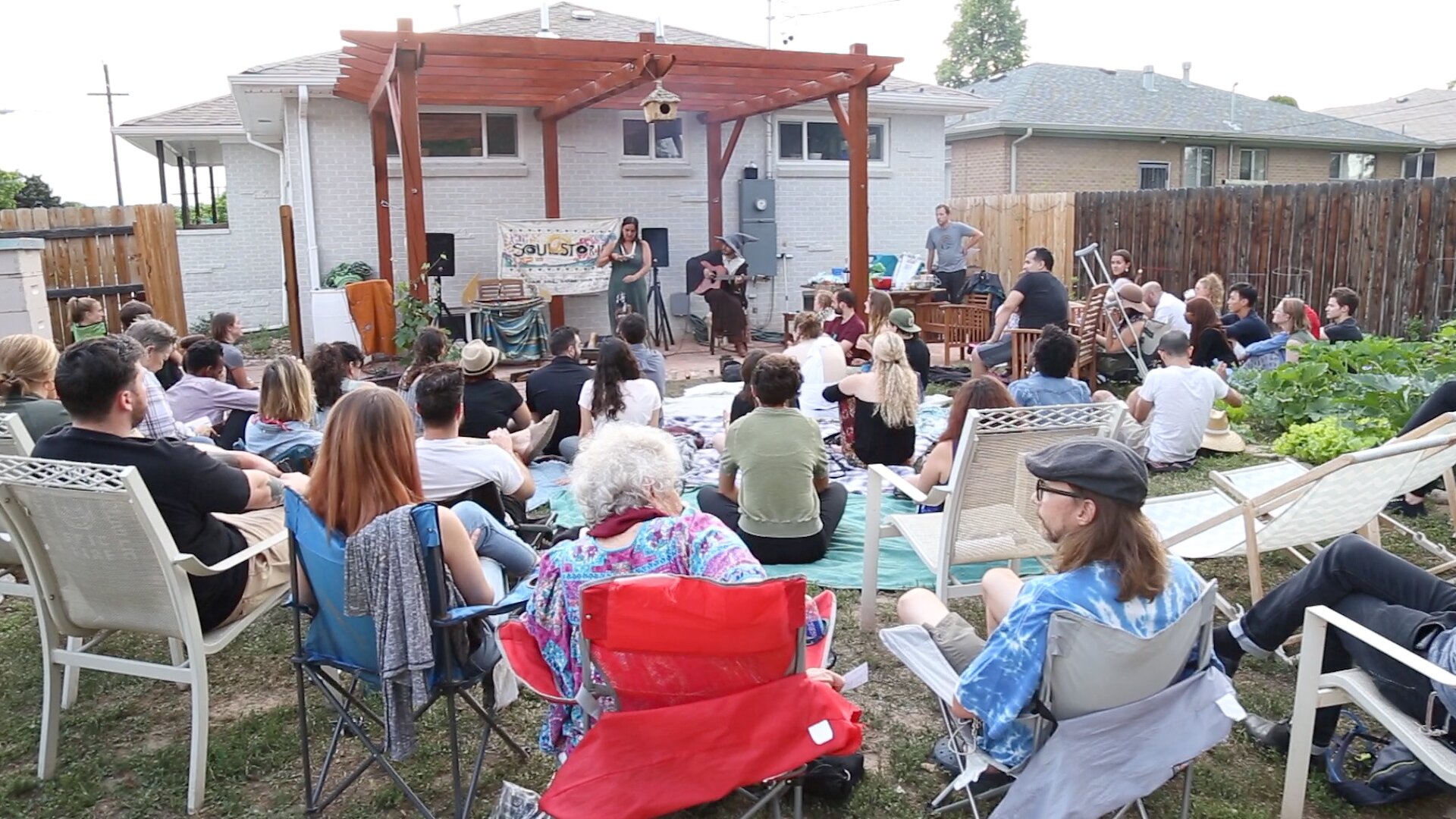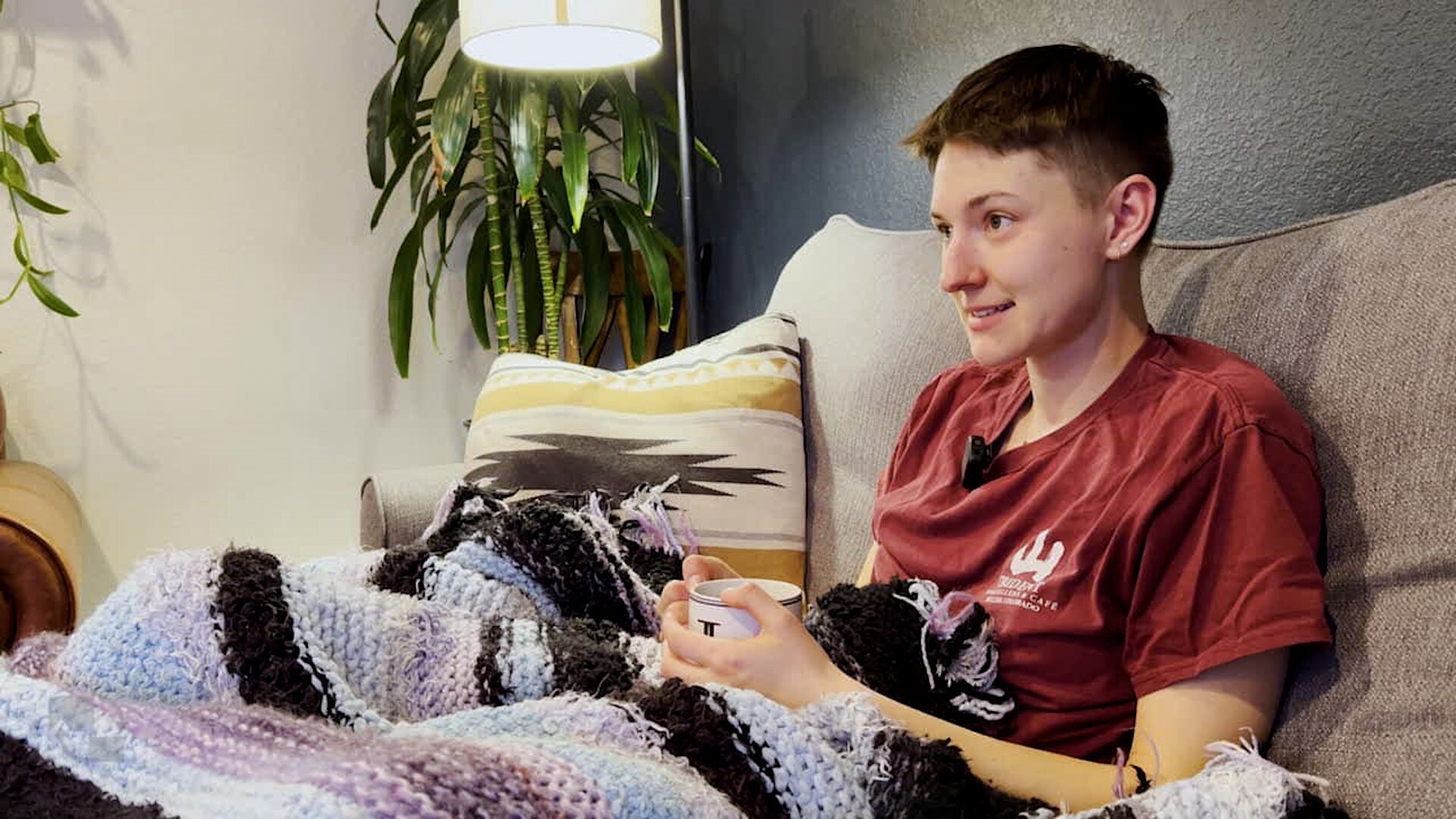Co-living model could build communities and ease a housing crisis

DENVER — If you ask Coloradans what their number one concern is, the majority say a lack of housing.
There are debates about the cause of the issue: inflation, lack of inventory, quick population growth … the list goes on. A common thread emerges in those conversations: it’s time to collaborate on creative solutions.
Tucked into Denver's Northeast Park Hill is a cozy home, unassuming besides the 300 square feet of garden beds in the front yard. You might not realize it just by looking at it, but this home is a living example of citizen solutions in action.
"Skyland House," as it is called, is an intentional community. Intentional communities are groups of people who typically have a common goal or issues they hope to address. Residents split the duties of a household and engage in other shared activities that serve their communal "intentions."
Life At Skyland House
True to their commitment to connection, members of Skyland House often collaborate on community-building outside their walls. Their community garden is more than a hobby. It’s a crucial element of their housing model considering they reside in a heavily gentrified food desert.
“Folks walk by on their way to school or on the on their way to the bus and they can help themselves,” said Bri Erger, the home's founder and co-owner.
Skyland House also has a backyard with a stage, where they host events open to the public and showcase an array of local creatives.

'Soul Stories,' a community storytelling event was one of many gatherings that happen at Skyland House. [image courtesy: Skyland House]
“One of my favorite memories is from this summer when we hosted a queer mixer in the backyard,” recalled Jules Weed, a Skyland House member. “Just unbridled joy bursting out of the seams of the backyard.”
The main focus of Skyland House is community-building and permaculture principles. Erger said the home has also evolved to be a welcoming space for many LGBTQIA+ people.
Although holding this identity wasn’t a requirement, around 80% of the applicants identified as LGBTQ+. Erger believes this was simply because she shared that she was part of the Queer community.
“I think people were drawn to the house knowing that they could show up,” said Erger. “I think everybody wants to feel at home where you are fully able to be yourself, to be comfortable, to be seen, to know that people are going to are going to get you.”
Members are required to complete an application and a group interview. They also split household chores, utilities and pay monthly rent. Logistics aside, members are also asked to agree to healthy communication, whether it’s speaking up if something is bothering them or hearing out a housemate with the shared goal of resolution.
In return, household members receive affordable rent, supportive community and a place to show up as their authentic selves — something that not only helps keep people housed, but can provide mental health benefits for all involved.
“It feels like a win-win where there's reduced rents, there is deeper, richer relationships. And we don't have maybe as much of a housing shortage as everyone says. Maybe we just need to rethink how we're occupying the homes that we do have,” said Erger.
What makes a house a home
Ensuring sustainable housing goes beyond physical shelter. As humans, we also need emotional and mental support.
According to a 2019 study by Colorado Coalition for the Homeless, young adults age 18-25 who identify as being LGBTQIA+ experience homelessness at over twice the rate of cis-hetero peers. Common factors that cause the high rates of homelessness for queer-identifying people include rejection by family, escaping ongoing abuse, and aging out of foster care.
Unfortunately, the residual effects of these barriers remain as LGBTQ+ people age and are sometimes exacerbated by issues like housing discrimination, employment discrimination and costly health problems.
Skyland House and spaces like it that provide supportive community for LGBTQ+ individuals provide a much-needed setting where people can have more of a chance to thrive physically, mentally and spiritually.
Weed, who identifies as transgender, can attest to this.
“I think I as a young person that I’m desperately seeking community at this stage in my life and looking, like, 'Okay, where do I fit in?'” he reflected. “I think the great thing thing about an intentional community is it can serve as family. And I think that's especially important when maybe the family that you're given doesn't feel like a safe place to come home to.”
Weed found Skyland House during an overwhelming move to Colorado on a $1,200 a month AmeriCorps stipend.
“I really thought that it was going to be a struggle. I thought that I was not going to enjoy the next year of my life. And then I found this place and these people, and I found that I was going to be able to preserve joy in my life."

House member Jules Weed gets cozy before a house meeting.
Erger holds similar sentiments. For a while, she was living in a different home with a long-term partner. After the breakup, she needed to return to Skyland, and was nervous how she would be received.
Erger teared up recalling the relief of being welcomed with open arms. “At the time my housemates were essentially strangers, and they let me show up kind of not knowing me. And they held the space. So for me personally, that was a beautiful gift.”
'Rethink Housing'
Erger is an associate with LiveWork Denver and is passionate about housing solutions.
She acknowledged that group living is not only good for the individuals involved, but it presents one of many essential housing alternatives in today’s climate.
Erger shared that co-living is now legally possible after Denver’s group living addendums were updated in February 2021 by City Council. Prior to that, it was illegal for any more than two unrelated individuals to live together.
While the law was not often enforced, it created a looming threat for people who needed to live in roommate scenarios, making them less likely to do things like contact their landlords for essential maintenance. It also prevented places like group living homes and rehab centers from being in areas zoned to be transit and resource-friendly.
Erger also highlighted how the group living limitations enabled discriminatory housing practices.
"It's the principle of it and what it actually represents. And for folks within the LGBTQ+ community, it's more likely that you may be living with someone that you're unmarried to. And so then that precludes you from having a greater community to live with," she explained.
Now, the amount has been increased to five unrelated adults per home. And while Erger hopes it increases even more, she thinks it's a step in the right direction. She hopes more solutions are presented and supported in the future.
In the meantime, Erger plans to continue her mission to help make housing more accessible and community-oriented and pursue deeper connections along the way.
"I think it's really important for folks to understand how important it is to live in community, especially community, with shared identities, including folks who identify as LGBTQ+. And hope that some folks see it as an inspiration to rethink housing."
Elle Naef is a digital media producer at Rocky Mountain PBS. You can reach her at ellenaef@rmpbs.org.
Jeremy Moore is the senior multimedia journalist at Rocky Mountain PBS. You can reach him at jeremymoore@rmpbs.org.